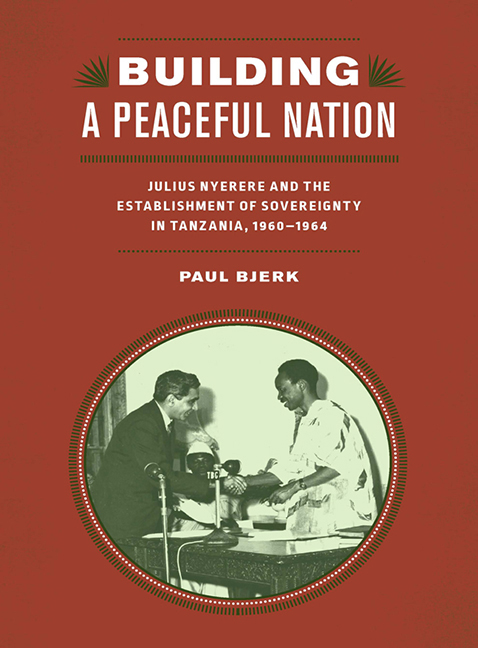 Building a Peaceful Nation
Building a Peaceful Nation 9 - The Cold War and the Union Treaty
Published online by Cambridge University Press: 08 May 2021
Summary
Within a week of the Zanzibari Revolution in January 1964, Oscar Kambona reported that the new Zanzibari leader Abeid Karume, together with Kassim Hanga and the influential Abdulrahman Babu, expressed interest in the idea of a “union or federal relationship with Tanganyika in the near future.” After the mutiny on the mainland, which had ironically left Nyerere in a strong position both internally and externally, Tanganyika entered into a tense period of diplomatic jockeying over the fate of revolutionary Zanzibar. In the Union of Tanganyika and Zanzibar, the East African leadership found a solution that satisfied all sides enough to restrain an outside intervention, and so retain East African control over the islands. As Kambona explained, the key issue was to maintain local autonomy from foreign interference: “Our first concern was the growing Communist presence, and second, the danger of the Cold War coming in. The Cold War was in the Congo already—it would have been a straight line across Africa… . The problem was how to isolate Zanzibar from the Eastern countries, yet not be used by the West for its own purposes.”
The details of this account largely agree with those of Issa Shivji, Thomas Burgess, Ian Speller, Frederick Jjuuko, and Godfrey Muriuki, but my analysis suggests that both Nyerere and Karume were concerned about increasing superpower interference in Zanzibar and sought to minimize it, fearing that it would fuel further violence. Western diplomats worked to retain a friendly government in Zanzibar as a strategic asset in the Indian Ocean, and Eastern countries made great efforts to cultivate the strong communist element in the Zanzibari leadership to create an ideological ally in East Africa. The Tanganyikan leadership sought only to keep Zanzibar from becoming dependent on either side. To accomplish this, Nyerere and Karume agreed to end revolutionary Zanzibar's tenuous sovereignty and place it within the ad hoc framework of a new sovereign state that came to be known as Tanzania.
Zanzibar, as petite as Congo was grand, was another key Cold War prize. East African leaders fought to maintain regional control over the course of events there.
- Type
- Chapter
- Information
- Building a Peaceful NationJulius Nyerere and the Establishment of Sovereignty in Tanzania, 1960–1964, pp. 206 - 227Publisher: Boydell & BrewerPrint publication year: 2015


